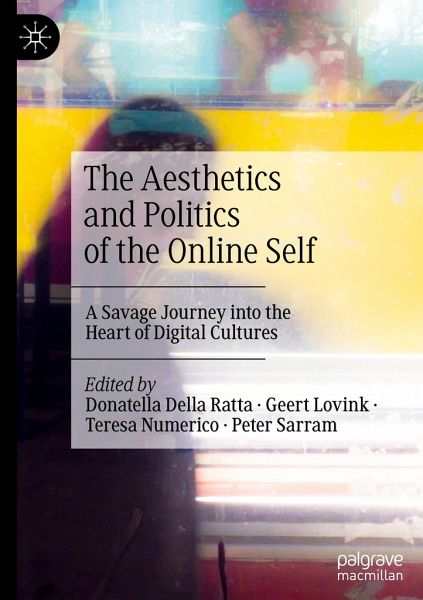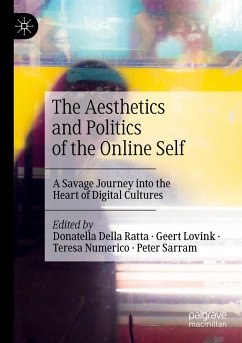
The Aesthetics and Politics of the Online Self
A Savage Journey into the Heart of Digital Cultures
Herausgegeben: Della Ratta, Donatella; Lovink, Geert; Numerico, Teresa; Sarram, Peter

PAYBACK Punkte
57 °P sammeln!
This volume investigates our dissonant and exuberant existences online. As social media users we know we're under surveillance, yet we continue to click, like, love and share ourselves online as if nothing was. So, how do we overcome the current online identity regime? Can we overthrow the rule of Narcissus and destroy the planetary middle class subject? In this catalogue of strategies, the reader will find stories on hacker groups, gaming platforms in the occupied territories, art objects, selfies, augmented reality, Gen Z autoethnographies, love and life. The authors of this anthology believ...
This volume investigates our dissonant and exuberant existences online. As social media users we know we're under surveillance, yet we continue to click, like, love and share ourselves online as if nothing was. So, how do we overcome the current online identity regime? Can we overthrow the rule of Narcissus and destroy the planetary middle class subject? In this catalogue of strategies, the reader will find stories on hacker groups, gaming platforms in the occupied territories, art objects, selfies, augmented reality, Gen Z autoethnographies, love and life. The authors of this anthology believe we cannot simply put vanity aside and a rational analysis of platform capitalism is not going to convince the youngs on TikTok nor liberate us from Zuckerbergian indentured servitude. Do we really need to wade through the subjective mud and 'learn more' about online aesthetics? The answer is yes.
Writing by Wendy Chun, Franco Berardi "BIFO", Julia Preisker, Katherine Behar, Rebecca Stein, Fabio Cristiano, Emilio Distretti, Natalie Bookchin, Ana Peraica, Mitra Azar, Donatella Della Ratta, Gabriella Coleman, Marco Deseriis, Alberto Micali, Daniel de Zeeuw, Giovanni Boccia Artieri, Jodi Dean.
Writing by Wendy Chun, Franco Berardi "BIFO", Julia Preisker, Katherine Behar, Rebecca Stein, Fabio Cristiano, Emilio Distretti, Natalie Bookchin, Ana Peraica, Mitra Azar, Donatella Della Ratta, Gabriella Coleman, Marco Deseriis, Alberto Micali, Daniel de Zeeuw, Giovanni Boccia Artieri, Jodi Dean.














